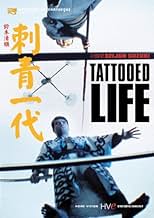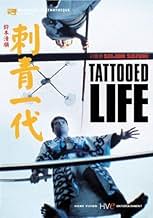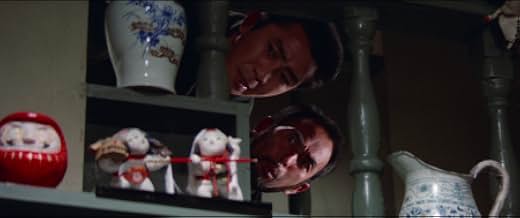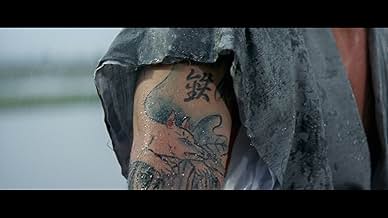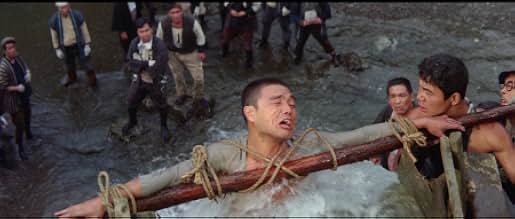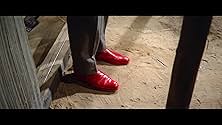AVALIAÇÃO DA IMDb
7,1/10
1,2 mil
SUA AVALIAÇÃO
Adicionar um enredo no seu idiomaAfter his own gang sets him up to kill a rival mobster, a hit man is forced to flee with his younger brother.After his own gang sets him up to kill a rival mobster, a hit man is forced to flee with his younger brother.After his own gang sets him up to kill a rival mobster, a hit man is forced to flee with his younger brother.
- Direção
- Roteiristas
- Artistas
- Direção
- Roteiristas
- Elenco e equipe completos
- Produção, bilheteria e muito mais no IMDbPro
Avaliações em destaque
The versatility and pathos Suzuki displays for what would otherwise be run of the mill yakuza flicks, never ceases to amaze me. Tattoed Life from 1965 is no exception to the rule of stylistically superior and emotionally powerful films he has under his belt.
The movie begins with the story of two brothers on the run after they murder a yakuza higher-up. One of them is the older, seasoned yakuza veteran. The other is the younger, sensitive artist. The older brother knows he's a no good criminal and thus wants to see his younger brother fulfill his dreams of becoming a sculptor. Trying to hide from the yakuzas that want their heads on a spike, first they get conned from a professional conman that promises transportation to China and then they join a construction crew that builds tunnels for another family. The story can be roughly divided into three acts. The escape from the yakuzas and their mishaps until they settle with the tunnel workers. The romance that develops between the brothers and the daughter and wife of their boss. And the final showdown.
The middle with its focus on romance and the dramatic relationship between the brothers may appear to drag a little, but it's every bit as important in establishing characters and setting up the final act. Suzuki elaborately constructs his characters, piece by piece, every scene adding to their personality and motives so when they final climax arrives, it's as powerful as it can possibly be.
Speaking of the final climax, it's easily the best part of the movie and a stylistic achievement in and off itself. Suzuki concocts an action opera full of psychedelic images, colourful lighting, deep shadows and peculiar camera angles to bring the story to a conclusion. Transformed in a Japanese Achilles, the older brother storms the enemy clan stamping grounds and aided with Suzuki's imaginative direction, skilled composition and set design, transforms a long combo of swordfight and gunfight action into a maelstrom of psychedelic images. It seems as if he was trying hard to restrain himself during the entire movie, so he could go out with all guns blazing for the finale. Fabulous.
A sprawling combination of drama and yakuza action with a dash of romance, Tattoed Life is the whole package. This is substance AND style at its best.
The movie begins with the story of two brothers on the run after they murder a yakuza higher-up. One of them is the older, seasoned yakuza veteran. The other is the younger, sensitive artist. The older brother knows he's a no good criminal and thus wants to see his younger brother fulfill his dreams of becoming a sculptor. Trying to hide from the yakuzas that want their heads on a spike, first they get conned from a professional conman that promises transportation to China and then they join a construction crew that builds tunnels for another family. The story can be roughly divided into three acts. The escape from the yakuzas and their mishaps until they settle with the tunnel workers. The romance that develops between the brothers and the daughter and wife of their boss. And the final showdown.
The middle with its focus on romance and the dramatic relationship between the brothers may appear to drag a little, but it's every bit as important in establishing characters and setting up the final act. Suzuki elaborately constructs his characters, piece by piece, every scene adding to their personality and motives so when they final climax arrives, it's as powerful as it can possibly be.
Speaking of the final climax, it's easily the best part of the movie and a stylistic achievement in and off itself. Suzuki concocts an action opera full of psychedelic images, colourful lighting, deep shadows and peculiar camera angles to bring the story to a conclusion. Transformed in a Japanese Achilles, the older brother storms the enemy clan stamping grounds and aided with Suzuki's imaginative direction, skilled composition and set design, transforms a long combo of swordfight and gunfight action into a maelstrom of psychedelic images. It seems as if he was trying hard to restrain himself during the entire movie, so he could go out with all guns blazing for the finale. Fabulous.
A sprawling combination of drama and yakuza action with a dash of romance, Tattoed Life is the whole package. This is substance AND style at its best.
Part of the cycle of genre and Yakuza movies that Suzuki directed for Nikkatsu in the early to mid sixties, this film is one of his most memorable. It may not be as well known here as other films in this cycle, probably due to the period setting (1925), and the fact that the middle section has no fighting or action, as it focuses on the fugitive yakuza hiding in the crew of a tunnel construction project.
Suzuki's design sense shines here, with bridges, trains, boats serving as a modern architectural counterpoint to the beautiful Japanese open vistas. It is interesting how similar the themes of this movie are to recent genre films such as Bangkok Dangerous, and how different the execution. The action scenes are short bursts of stylized fighting mixing gunplay with samurai action. The story is more engaging than Suzuki's other Yakusa films. I got the feeling that the director was trying his best to explode the strict confines of the genre, while delivering a commercial product. The buildup to the extraordinary final confrontation, a choreographed samurai style fight inside and outside a traditional Japanese house, is very satisfying. Also interesting are the weird touches like the red boots two of the movie's characters wear.
In my humble opinion, another classic from Mr Suzuki.
Suzuki's design sense shines here, with bridges, trains, boats serving as a modern architectural counterpoint to the beautiful Japanese open vistas. It is interesting how similar the themes of this movie are to recent genre films such as Bangkok Dangerous, and how different the execution. The action scenes are short bursts of stylized fighting mixing gunplay with samurai action. The story is more engaging than Suzuki's other Yakusa films. I got the feeling that the director was trying his best to explode the strict confines of the genre, while delivering a commercial product. The buildup to the extraordinary final confrontation, a choreographed samurai style fight inside and outside a traditional Japanese house, is very satisfying. Also interesting are the weird touches like the red boots two of the movie's characters wear.
In my humble opinion, another classic from Mr Suzuki.
Tattooed Life, originally known as Irezumi Ichidai, is a historical gangster drama directed by renowned genre specialist Suzuki Seijun and stars Takahashi Hideki and Hananomoto Kotobuki as lead actors portraying two brothers going into hiding in a mining town.
The story revolves around yakuza hitman Tetsuo who gets set up by his own family who attempts to murder him. He is saved by his artistic brother Kenji who struggles much with his crime. The two brothers are forced to flee to a coastal town and plan on setting sail to Manchuria. However, they are double-crossed by a charismatic gangster and end up penniless. They decide to earn the respect of the local miners to join their ranks. Kenji falls in love with his boss's wife while Tetsuo can't escape the charm of the boss's sister-in-law. Things however take a sour turn when an ambitious detective attempts to track them down and a jealous accountant tries to backstab them.
This gangster drama convinces on several levels. First and foremost, the acting performances from the lead actors, lead actresses and even side characters are absolutely outstanding throughout. Up next, the script includes a few dynamic twists and turns to keep viewers interested until the very end. The film's settings are absolutely stunning and vary from desolate wastelands over port installations to mining locations in the mountains. The movie also uses costumes and make-up particularly well which helps distinguishing the different characters and their specific backgrounds. The quality of the light and sound techniques is excellent for its time and separates this movie from many other contemporary genre flicks. The camera work is calm and focused and the renowned director has done an excellent job while also offering some experimental segments in the movie's gripping resolution. Studio executives didn't appreciate said creativity back in the days but this imagination has aged particularly well and shows that the director was at least a decade ahead of his time in terms of style and wit.
Few things deserve to be criticized regarding this very good genre film. The general story line doesn't offer anything new in terms of backstabbing among gangsters, the protagonists going into hiding and the survivors being on a brutal quest for revenge. Some of the characters' decisions seem completely unrealistic and pulled out of thin air as they will ask viewers for a suspension of disbelief. Those flaws are however so minor that they won't ruin this wonderful gangster drama for you.
At the end of the day, Tattooed Life, originally entitled Irezumi Ichidai, is an entertaining gangster drama that entertains with great acting performances, clever scriptwriting, captivating settings, a wonderful use of costumes and make-up, stunning light and sound techniques, focused camera work and an experimental directing approach. The only noteworthy downsides are an overall stereotypical plot and several decisions made by the lead characters that ask for a generous suspension of disbelief. Since the movie itself portrays an era of the past, it has surprisingly stood the test of time and serves as a gripping portrayal of Japan's Taisho era of the mid-twenties of the twentieth century. Cineasts interested in intense personal dramas, gripping gangster movies and Japanese culture and history should definitely give this overlooked gem a fair chance.
The story revolves around yakuza hitman Tetsuo who gets set up by his own family who attempts to murder him. He is saved by his artistic brother Kenji who struggles much with his crime. The two brothers are forced to flee to a coastal town and plan on setting sail to Manchuria. However, they are double-crossed by a charismatic gangster and end up penniless. They decide to earn the respect of the local miners to join their ranks. Kenji falls in love with his boss's wife while Tetsuo can't escape the charm of the boss's sister-in-law. Things however take a sour turn when an ambitious detective attempts to track them down and a jealous accountant tries to backstab them.
This gangster drama convinces on several levels. First and foremost, the acting performances from the lead actors, lead actresses and even side characters are absolutely outstanding throughout. Up next, the script includes a few dynamic twists and turns to keep viewers interested until the very end. The film's settings are absolutely stunning and vary from desolate wastelands over port installations to mining locations in the mountains. The movie also uses costumes and make-up particularly well which helps distinguishing the different characters and their specific backgrounds. The quality of the light and sound techniques is excellent for its time and separates this movie from many other contemporary genre flicks. The camera work is calm and focused and the renowned director has done an excellent job while also offering some experimental segments in the movie's gripping resolution. Studio executives didn't appreciate said creativity back in the days but this imagination has aged particularly well and shows that the director was at least a decade ahead of his time in terms of style and wit.
Few things deserve to be criticized regarding this very good genre film. The general story line doesn't offer anything new in terms of backstabbing among gangsters, the protagonists going into hiding and the survivors being on a brutal quest for revenge. Some of the characters' decisions seem completely unrealistic and pulled out of thin air as they will ask viewers for a suspension of disbelief. Those flaws are however so minor that they won't ruin this wonderful gangster drama for you.
At the end of the day, Tattooed Life, originally entitled Irezumi Ichidai, is an entertaining gangster drama that entertains with great acting performances, clever scriptwriting, captivating settings, a wonderful use of costumes and make-up, stunning light and sound techniques, focused camera work and an experimental directing approach. The only noteworthy downsides are an overall stereotypical plot and several decisions made by the lead characters that ask for a generous suspension of disbelief. Since the movie itself portrays an era of the past, it has surprisingly stood the test of time and serves as a gripping portrayal of Japan's Taisho era of the mid-twenties of the twentieth century. Cineasts interested in intense personal dramas, gripping gangster movies and Japanese culture and history should definitely give this overlooked gem a fair chance.
As a fan of Suzuki's films I find this lesser known one to be his best. The story is told very traditionally and has some interesting facets. There is the unexpected love story and an uncommon setting. The love story in particular and the way it evolves is handled with the greatest of care and without any of the madness that trademarks some of the author's films. So Suzuki slowly builds an intrigue which although quite original is perfectly understandable. And then he boils down all of what he is notorious for, expressive colors, exquisite angles,... in the final act which you will want to watch over and over again. If you are scared away by the slow pacing of some Japanese film this one will reward you with this final act which I found to be one of the most memorable ever.
Você sabia?
- ConexõesFeatured in Best in Action: 1965 (2021)
Principais escolhas
Faça login para avaliar e ver a lista de recomendações personalizadas
Detalhes
- Tempo de duração1 hora 27 minutos
- Mixagem de som
- Proporção
- 2.35 : 1
Contribua para esta página
Sugerir uma alteração ou adicionar conteúdo ausente

Principal brecha
By what name was A Vida de um Tatuado (1965) officially released in Canada in English?
Responda
